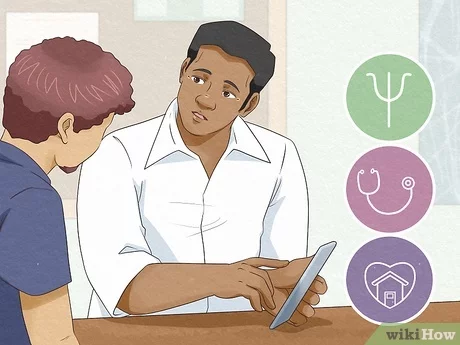Sex addiction is a condition that can severely impact your life, relationships, and overall well-being. It’s not just about the act itself but the compulsive behavior that accompanies it, often leading to shame, secrecy, and distress. However, it’s crucial to understand that recovery is possible with the right steps and support system in place. This guide will provide practical tips on how to overcome sex addiction and take steps toward a healthier, more balanced life.
Sex addiction, like any other addiction, can deeply affect various aspects of life, from relationships to mental and physical health. The journey to recovery may seem daunting, but with the right steps and a commitment to healing, overcoming sex addiction is possible. This detail will walk through practical steps to begin recovery, focusing on awareness, seeking professional help, understanding triggers, and building a supportive environment. It will also address the importance of self-care and patience. By learning how to overcome sex addiction, individuals can reclaim control over their lives and nurture healthier relationships.
Acknowledge the Addiction
The first and most important step in overcoming any addiction is acknowledging that there is a problem. Denial can keep you trapped in unhealthy cycles, but acceptance opens the door to healing. It’s okay to admit that you’re struggling with sex addiction, as this recognition is a powerful starting point for change.
Addiction thrives in secrecy, so the act of acknowledgment can bring a significant sense of relief. Once you’ve accepted that the problem exists, you can begin to focus on recovery and healthier behaviors.
Educate Yourself About Sex Addiction
Knowledge is a powerful tool in the fight against addiction. By learning about sex addiction, you can understand how it affects your brain, emotions, and behavior. Addiction isn’t just about willpower; it’s a complex issue that rewires your brain’s reward system, making it difficult to control impulses.
Take time to read books, watch documentaries, or speak with professionals who specialize in addiction recovery. The more you know about how to overcome sex addiction, the more equipped you’ll be to manage it effectively.
Seek Professional Help
Overcoming sex addiction often requires the help of a trained professional. Therapists who specialize in addiction, particularly sex addiction, can provide valuable insights and tools for managing compulsive behaviors.
Cognitive Behavioral Therapy (CBT): This therapy helps individuals identify and change negative thought patterns that contribute to their addiction.
Group Therapy: Sharing your experience with others facing similar challenges can be incredibly beneficial. Support groups like Sex Addicts Anonymous (SAA) provide a safe space for individuals to talk about their struggles and victories.
Professional help is vital in providing structured guidance, offering coping mechanisms, and holding you accountable during the recovery process.
Understand Your Triggers
Triggers are the situations, emotions, or experiences that prompt addictive behavior. Identifying your triggers is crucial in learning how to overcome sex addiction because it allows you to avoid situations or emotions that may lead to relapse.
Keep a journal and note when you feel the urge to engage in addictive behaviors. Are you stressed, lonely, or bored? By understanding what leads to compulsive sexual behavior, you can develop strategies to cope with these emotions in healthier ways, such as exercising, meditating, or seeking support from a friend.
Create a Supportive Environment
Recovery is not something you need to do alone. Surrounding yourself with supportive, non-judgmental people can make a significant difference. A solid support system will help you stay accountable, celebrate your progress, and offer encouragement when things get tough.
Support Groups: Joining a sex addiction support group can provide a sense of community. Hearing from others who have successfully managed their addiction can give you hope and motivation.
Family and Friends: If you’re comfortable, consider opening up to trusted family members or friends. Let them know about your struggles and ask for their support during this time.
By creating a network of supportive individuals, you’ll find it easier to stay on track and avoid relapse.
Practice Self-Care
Recovery from sex addiction isn’t just about quitting the behavior. It’s also about nurturing yourself and building a life that feels fulfilling and satisfying without reliance on addictive behaviors.
Self-care can take many forms, such as:
Physical Self-Care: Exercise regularly, maintain a healthy diet, and ensure you’re getting enough sleep.
Emotional Self-Care: Engage in activities that help reduce stress and anxiety, such as yoga, meditation, or creative hobbies.
Spiritual Self-Care: If applicable, engage in practices that bring you a sense of peace, such as prayer, mindfulness, or spending time in nature.
Taking care of yourself holistically will help you feel stronger and more equipped to handle the challenges of recovery.
Set Realistic Goals
Addiction recovery is not a linear process, and it’s important to set realistic, achievable goals. Expect setbacks, and don’t be too hard on yourself if you slip up. What matters is that you keep moving forward and remain committed to the process.
Break down your recovery into small, manageable steps:
Short-term goals: These can be daily or weekly objectives like attending therapy, practicing self-care, or avoiding specific triggers.
Long-term goals: Focus on rebuilding relationships, finding healthier ways to express intimacy, and ultimately living a balanced, addiction-free life.
By setting clear goals, you’ll have a roadmap to guide you through the recovery process.
Be Patient with Yourself
Overcoming sex addiction takes time. Be patient with yourself, and don’t rush the process. You may experience emotional highs and lows, but remember that recovery is a journey. Celebrate the small victories and don’t be discouraged by setbacks.
Each step forward, no matter how small, brings you closer to living a life free from the grip of addiction. Keep reminding yourself that how to overcome sex addiction is a gradual process that requires both time and effort.
FAQs about Overcoming Sex Addiction
Q: What is the first step in overcoming sex addiction?
A: The first step is acknowledging that you have a problem. Recognizing the addiction allows you to seek the necessary help and begin your recovery journey.
Q: Can sex addiction be cured?
A: While addiction may not have a “cure,” it can be effectively managed. Many people with sex addiction learn to control their behaviors and live healthy, balanced lives through therapy and support systems.
Q: How long does it take to recover from sex addiction?
A: Recovery time varies from person to person. It depends on the individual’s commitment, support system, and therapy. The process is ongoing, but significant progress can be made over months or years.
Q: Are there medications to help overcome sex addiction?
A: While there is no specific medication for sex addiction, some medications can help manage symptoms of underlying mental health conditions like depression or anxiety, which can contribute to addiction.
Q: How can family and friends support someone with sex addiction?
A: Family and friends can offer support by listening without judgment, encouraging the person to seek professional help, and being patient as they work through their recovery.
In conclusion, learning how to overcome sex addiction is a process that involves self-awareness, professional help, understanding triggers, and building a strong support system. Recovery is possible with the right steps and the commitment to make meaningful changes in your life.








